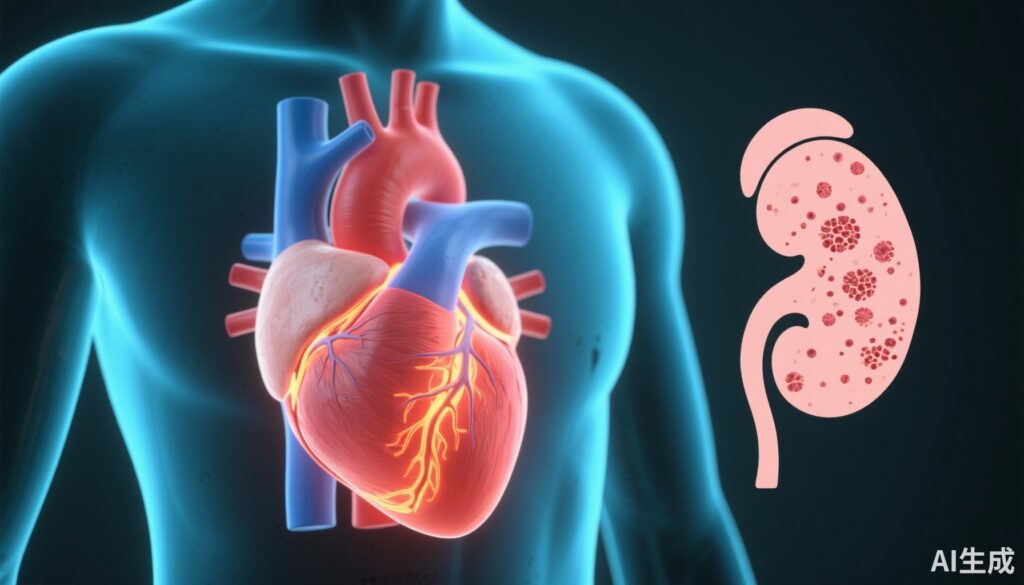Highlight
Dapagliflozin treatment in patients with chronic kidney disease (CKD) significantly reduces left ventricular mass index (LVMI), indicating beneficial effects on adverse cardiac remodeling.
The cardioprotective benefits observed with SGLT2 inhibitors may be mediated through effects on cardiac structure, providing insight into mechanisms beyond glucose lowering.
This randomized controlled trial demonstrates consistent benefits across diverse CKD etiologies and cardiovascular risk profiles without increased serious adverse events.
Study Background
Chronic kidney disease is a prevalent condition characterized by progressive loss of renal function, often accompanied by adverse cardiac remodeling, including left ventricular hypertrophy. This pathophysiological cardiac alteration contributes substantially to the elevated cardiovascular morbidity and mortality observed in CKD patients. Despite advances in management, cardiovascular risk remains high, and there is a critical unmet need to identify interventions that can mitigate structural cardiac changes and improve outcomes.
Sodium-glucose cotransporter 2 (SGLT2) inhibitors, initially developed as glucose-lowering agents in diabetes, have emerged as promising therapies with notable cardioprotective and renoprotective effects. Their benefit in CKD populations, irrespective of diabetes status, is increasingly recognized. However, the mechanisms underlying their cardiovascular benefits remain incompletely elucidated, particularly in the context of cardiac remodeling. Understanding the impact of SGLT2 inhibition on cardiac structure and function is essential to optimize therapeutic strategies for CKD patients.
Study Design
The Effects of Dapagliflozin on Echocardiographic Measures of Cardiac Structure and Function in Patients with Chronic Kidney Disease (DECODE-CKD) trial was a 6-month, randomized, double-blind, placebo-controlled, single-center study designed to examine the cardiac effects of dapagliflozin in CKD patients.
Eligible participants included adults with chronic kidney disease defined as an estimated glomerular filtration rate (eGFR) between 20 and 59 ml/min/1.73 m², or an eGFR ≥60 ml/min/1.73 m² with a urine albumin-creatinine ratio (UACR) ≥200 mg/g. Importantly, the cohort was heterogeneous with respect to CKD etiology and cardiovascular comorbidity status, reflecting real-world diversity.
Participants were randomized to receive dapagliflozin or placebo. Serial transthoracic echocardiography was performed to assess cardiac structure, with the primary efficacy endpoint being change in left ventricular mass index (LVMI). Secondary endpoints included evaluation of systolic and diastolic function, biomarkers such as high-sensitivity troponin I and pro-B-type natriuretic peptides, blood hemoglobin levels, urinary albumin-to-creatinine ratio, and serum creatinine levels.
Key Findings
Among 222 randomized participants (mean age 67.5 years; 29.3% women), the trial demonstrated a statistically significant and clinically meaningful reduction in LVMI with dapagliflozin compared to placebo, with an estimated mean difference of -8.44 g/m² (95% CI -11.83 to -5.06; P < 0.001). This reduction signals attenuation of left ventricular hypertrophy, a key marker of adverse cardiac remodeling linked to worse cardiovascular outcomes.
This effect was consistent across multiple subgroups regardless of demographics, baseline cardiovascular disease, heart failure history, biomarkers, or CKD cause, including hypertensive nephropathy and polycystic kidney disease. Notably, the presence of hypertension in 75.7% and cardiovascular disease in 34.2% of participants highlights the high-risk profile of the population.
Secondary analyses revealed no significant worsening of cardiac systolic or diastolic function, suggesting that LV mass regression was not at the expense of cardiac performance. Biomarker trends favored dapagliflozin, although these were secondary endpoints requiring further validation.
Importantly, safety profiles were comparable between dapagliflozin and placebo groups, with no increase in serious adverse events, supporting the tolerability of the intervention in this vulnerable population.
Expert Commentary
The DECODE-CKD trial provides compelling mechanistic evidence supporting SGLT2 inhibitors as modulators of cardiac structure in CKD. The observed regression of left ventricular hypertrophy may underpin the early cardiovascular event risk reduction documented in large outcome trials with these agents.
Authors and expert commentators posit that possible mechanisms include reductions in cardiac preload and afterload through natriuresis and blood pressure lowering, improved myocardial energetics, and attenuation of fibrosis and inflammation. However, the trial’s 6-month duration limits insights into long-term cardiac remodeling dynamics.
Limitations include the single-center design, moderate sample size, and the relatively short treatment and observation period. Future multicenter and longer-term studies are warranted to confirm sustained cardiac benefits, examine impacts on clinical endpoints such as heart failure hospitalization and mortality, and delineate specific mechanistic pathways.
Conclusion
Dapagliflozin significantly reduces left ventricular mass index in patients with chronic kidney disease, reflecting favorable modulation of adverse cardiac remodeling. These findings illuminate a key mechanism through which SGLT2 inhibitors confer cardioprotective effects and support their broader therapeutic role in CKD management, independent of diabetes status.
Clinicians should consider the cardiac benefits of SGLT2 inhibitors when treating patients with CKD, particularly given their safety and consistent efficacy across diverse subgroups. Continued research is essential to elucidate long-term cardiac and renal outcomes and optimize individualized patient care strategies.
Funding and Trial Registration
This study was funded by the Danish Cardiovascular Academy and Novo Nordisk Foundation. The trial is registered at ClinicalTrials.gov under the identifier NCT05359263.
References
Bartholdy KV, Johansen ND, Skaarup KG, et al. Cardiac Effects of Dapagliflozin in People with Chronic Kidney Disease. NEJM Evid. 2025 Nov;4(11):EVIDoa2500158. doi:10.1056/EVIDoa2500158. Epub 2025 Oct 28. PMID: 41147829.



